College of Business: Islamic Finance Assignment 1 Analysis
VerifiedAdded on 2022/09/12
|5
|1338
|11
Homework Assignment
AI Summary
This assignment analyzes key aspects of Islamic finance and banking, addressing the prohibition of riba (interest), corporate governance in Islamic banks, and ethical principles derived from Sharia law. The solution explores the advantages and disadvantages of riba from the author's perspective, examining its impact on conventional banks and the competitive landscape. It also covers the development of Islamic banking, highlighting its appeal to investors and its regulatory environment. The assignment further delves into ethical principles such as universalism, brotherhood, and partnership, emphasizing the role of Sharia in shaping Islamic banking practices and promoting economic growth. The author references relevant academic sources to support the arguments and analyses.

Running head: ISLAMIC LAW 1
Islamic Law
Name
Institution
Islamic Law
Name
Institution
Paraphrase This Document
Need a fresh take? Get an instant paraphrase of this document with our AI Paraphraser

ISLAMIC LAW 2
1) The Islamic banking system functions according to Islamic law; therefore numerous
Islamic restrictions inhibit the operation of the banking system. The most important restriction is
the prohibition of interest=riba, this limit the freedom of most Islamic banks to establish suitable
financing instruments to help in supporting young, innovative businesses (Alharbi, 2015). Most
of the restrictions such as riba often enlarge the risks of the institution (bank); particularly when
financing most of the businesses, hence the bank either tries to assume the Islamic law or avoids
these businesses.
As for me, I would prefer the conventional banks to take and give riba. The prohibition of
riba indeed has some essential benefits both to the citizens and the institution, to me, I believe
that the give and take of interest can improve the performance of most banks. Currently, the
prohibition of riba in most Islamic banks means a ban of interests and not a ban of usury. From
an economic point of view, this system causes numerous problems (Hamzah, Ishak & Nor,
2015). The institution (bank) has to establish loans without interest that are profitable for the
institution. These concepts remain Islamic-conform Loss-Profit sharing concepts. For the letter,
the institution (bank) is only permitted to claim a service fee, which is often not linked to the
total amount of money provided as loans but solely to the service offered, so it may only cover
short-term loans which often has no value. IR (Interest rates) holds benefits for both lenders and
borrowers. FIRS (Fixed Interest Rate) remains attractive to people who want to have a good
understanding of the method of loan payments. On the other hand, if the IR decreases most of the
banks shall make more money from their consumers because they shall charge higher IR loans.
The profitability of the banking sector increases with the hikes of the interest rate. The take and
give of riba shall allow all conventional banks to have huge cash holdings because of consumer
1) The Islamic banking system functions according to Islamic law; therefore numerous
Islamic restrictions inhibit the operation of the banking system. The most important restriction is
the prohibition of interest=riba, this limit the freedom of most Islamic banks to establish suitable
financing instruments to help in supporting young, innovative businesses (Alharbi, 2015). Most
of the restrictions such as riba often enlarge the risks of the institution (bank); particularly when
financing most of the businesses, hence the bank either tries to assume the Islamic law or avoids
these businesses.
As for me, I would prefer the conventional banks to take and give riba. The prohibition of
riba indeed has some essential benefits both to the citizens and the institution, to me, I believe
that the give and take of interest can improve the performance of most banks. Currently, the
prohibition of riba in most Islamic banks means a ban of interests and not a ban of usury. From
an economic point of view, this system causes numerous problems (Hamzah, Ishak & Nor,
2015). The institution (bank) has to establish loans without interest that are profitable for the
institution. These concepts remain Islamic-conform Loss-Profit sharing concepts. For the letter,
the institution (bank) is only permitted to claim a service fee, which is often not linked to the
total amount of money provided as loans but solely to the service offered, so it may only cover
short-term loans which often has no value. IR (Interest rates) holds benefits for both lenders and
borrowers. FIRS (Fixed Interest Rate) remains attractive to people who want to have a good
understanding of the method of loan payments. On the other hand, if the IR decreases most of the
banks shall make more money from their consumers because they shall charge higher IR loans.
The profitability of the banking sector increases with the hikes of the interest rate. The take and
give of riba shall allow all conventional banks to have huge cash holdings because of consumer

ISLAMIC LAW 3
balances as well as business activities. The interest rate that is provided by all conventional
banks often affects the decisions of individuals on whether to spend or save their money.
Normally, when the rates of interest are high many individuals shall deposit or save more of their
money. Therefore, this indicates how riba/interest is the most important factor in the decision-
making process for financial institutions and people.
When all the conventional banks stop the take and give of interest/riba, they will all lower
their competitive edge in the market. This is because this model only performs well in Islamic
countries. Many researchers argue that most of the Islamic banks have performed well in their
home markets and this shows that most of the Islamic banks are more inefficient and relaxed as
compared to their convention competitors who function in a more competitive environment.
The main disadvantage that all conventional banks will face is that they will lose a lot of
the customers because most of the Muslims shall shift to other banks that follow sharia law to the
letter. Most of the Islamic banks shall attract many consumers from conventional banks.
Numerous verse of Quran indicates that the ban on riba can promote the growth of most people.
Under Islamic law, a dollar should not be allowed to make more dollars. Instead, an organization
should offer some service to make its profits. Therefore, instead of the original accounts which
allow the use of interest rates, the banks offer accounts that offer loss/profit. But for the
conventional banks to perform well in Islamic countries, they need to establish far more strong
risk management protocols that can make them perform well in the Islamic countries. Naturally,
this strategy shall make them perform well as compared to their Islamic banks.
Finally, the stated advantages of giving and taking of riba support the reason why all
conventional banks should give their customers interest rates on the loans. I strongly believe that
the give and take of riba can make the banks to be more competitive in the market.
balances as well as business activities. The interest rate that is provided by all conventional
banks often affects the decisions of individuals on whether to spend or save their money.
Normally, when the rates of interest are high many individuals shall deposit or save more of their
money. Therefore, this indicates how riba/interest is the most important factor in the decision-
making process for financial institutions and people.
When all the conventional banks stop the take and give of interest/riba, they will all lower
their competitive edge in the market. This is because this model only performs well in Islamic
countries. Many researchers argue that most of the Islamic banks have performed well in their
home markets and this shows that most of the Islamic banks are more inefficient and relaxed as
compared to their convention competitors who function in a more competitive environment.
The main disadvantage that all conventional banks will face is that they will lose a lot of
the customers because most of the Muslims shall shift to other banks that follow sharia law to the
letter. Most of the Islamic banks shall attract many consumers from conventional banks.
Numerous verse of Quran indicates that the ban on riba can promote the growth of most people.
Under Islamic law, a dollar should not be allowed to make more dollars. Instead, an organization
should offer some service to make its profits. Therefore, instead of the original accounts which
allow the use of interest rates, the banks offer accounts that offer loss/profit. But for the
conventional banks to perform well in Islamic countries, they need to establish far more strong
risk management protocols that can make them perform well in the Islamic countries. Naturally,
this strategy shall make them perform well as compared to their Islamic banks.
Finally, the stated advantages of giving and taking of riba support the reason why all
conventional banks should give their customers interest rates on the loans. I strongly believe that
the give and take of riba can make the banks to be more competitive in the market.
⊘ This is a preview!⊘
Do you want full access?
Subscribe today to unlock all pages.

Trusted by 1+ million students worldwide

ISLAMIC LAW 4
2) Islamic banks started to offer sharia-compliant products in the year 1970s. Since then
Islamic banks have developed into a global sector with total assets of approximately $920
trillion. The development of Islamic banks over the past years indicates that the value
proposition of Islamic banks is more attractive to global investors from both non-Muslim and
Muslim persuasion (Alam, Gupta & Shanmugam, 2017). In Islamic banks, the investors who
most of them are the depositors are often treated as if they were shareholders of the institution. If
the institution (bank) earns a profit, then the investors would be allowed to get a certain amount
of these profits. Most Islamic banks have a sound regulatory environment and transparent
governance structure that protect the interest of the investors.
3) sharia inspires Islamic banks to adopt and have a positive attitude to make a profit and
attain economic growth according to the ethics of Islamic (Keshavjee, 2016). The main function
of Islamic banks is not only to increase profits; it also considers religious beliefs and power
requirements. The relationship between business and religion led to the establishment of a causal
model that helped create a connection between performance as well as customer satisfaction.
Some of the ethical principles include:
Principle of Universalism and Brotherhood: The Islamic ethical principles remain
universal. Most Islamic follow this principle in that the ban of usury is universal (Hamzah, Ishak
& Nor, 2015). All Islamic banks ban the payment and collection of usury
Principle of partnership: the sharia encourages Islamic banks to cooperate with other
banks in piety and righteousness and not on wicked acts and enmity (Birton & Sholihin, 2018).
Most Islamic banks apply this principle in that they help the poor and people in society, and they
also partner with other banks with a view of providing aid to the needy people.
2) Islamic banks started to offer sharia-compliant products in the year 1970s. Since then
Islamic banks have developed into a global sector with total assets of approximately $920
trillion. The development of Islamic banks over the past years indicates that the value
proposition of Islamic banks is more attractive to global investors from both non-Muslim and
Muslim persuasion (Alam, Gupta & Shanmugam, 2017). In Islamic banks, the investors who
most of them are the depositors are often treated as if they were shareholders of the institution. If
the institution (bank) earns a profit, then the investors would be allowed to get a certain amount
of these profits. Most Islamic banks have a sound regulatory environment and transparent
governance structure that protect the interest of the investors.
3) sharia inspires Islamic banks to adopt and have a positive attitude to make a profit and
attain economic growth according to the ethics of Islamic (Keshavjee, 2016). The main function
of Islamic banks is not only to increase profits; it also considers religious beliefs and power
requirements. The relationship between business and religion led to the establishment of a causal
model that helped create a connection between performance as well as customer satisfaction.
Some of the ethical principles include:
Principle of Universalism and Brotherhood: The Islamic ethical principles remain
universal. Most Islamic follow this principle in that the ban of usury is universal (Hamzah, Ishak
& Nor, 2015). All Islamic banks ban the payment and collection of usury
Principle of partnership: the sharia encourages Islamic banks to cooperate with other
banks in piety and righteousness and not on wicked acts and enmity (Birton & Sholihin, 2018).
Most Islamic banks apply this principle in that they help the poor and people in society, and they
also partner with other banks with a view of providing aid to the needy people.
Paraphrase This Document
Need a fresh take? Get an instant paraphrase of this document with our AI Paraphraser

ISLAMIC LAW 5
References
Alam, N., Gupta, L., & Shanmugam, B. (2017). Corporate Governance in Islamic Banks.
In Islamic Finance (pp. 359-396). Palgrave Macmillan, Cham.
Alharbi, A. (2015). Development of the Islamic banking system. Journal of Islamic Banking and
Finance, 3(1), 12-25.
Arafah, W., & Nugroho, L. (2016). Maqhashid sharia in clean water financing business model at
Islamic bank. International Journal of Business and Management Invention, 5(2), 22-32.
Birton, M. N. A., & Sholihin, M. (2018). Towards a Maqashid sharia-based conceptual
framework of Islamic financial reporting in Indonesia: criticizing “Economic” decision
usefulness objective.
Hamzah, N., Ishak, N. M., & Nor, N. I. M. (2015). Customer satisfactions on Islamic banking
system. Journal of Economics, Business and Management, 3(1), 140-144.
Keshavjee, M. M. (2016). Alternative dispute resolution (ADR) and its potential for helping
Muslims reclaim the higher ethical values (Maqasid) underpinning the Sharia. In The
State of Social Progress of Islamic Societies (pp. 607-621). Springer, Cham.
References
Alam, N., Gupta, L., & Shanmugam, B. (2017). Corporate Governance in Islamic Banks.
In Islamic Finance (pp. 359-396). Palgrave Macmillan, Cham.
Alharbi, A. (2015). Development of the Islamic banking system. Journal of Islamic Banking and
Finance, 3(1), 12-25.
Arafah, W., & Nugroho, L. (2016). Maqhashid sharia in clean water financing business model at
Islamic bank. International Journal of Business and Management Invention, 5(2), 22-32.
Birton, M. N. A., & Sholihin, M. (2018). Towards a Maqashid sharia-based conceptual
framework of Islamic financial reporting in Indonesia: criticizing “Economic” decision
usefulness objective.
Hamzah, N., Ishak, N. M., & Nor, N. I. M. (2015). Customer satisfactions on Islamic banking
system. Journal of Economics, Business and Management, 3(1), 140-144.
Keshavjee, M. M. (2016). Alternative dispute resolution (ADR) and its potential for helping
Muslims reclaim the higher ethical values (Maqasid) underpinning the Sharia. In The
State of Social Progress of Islamic Societies (pp. 607-621). Springer, Cham.
1 out of 5
Related Documents
Your All-in-One AI-Powered Toolkit for Academic Success.
+13062052269
info@desklib.com
Available 24*7 on WhatsApp / Email
![[object Object]](/_next/static/media/star-bottom.7253800d.svg)
Unlock your academic potential
Copyright © 2020–2026 A2Z Services. All Rights Reserved. Developed and managed by ZUCOL.





